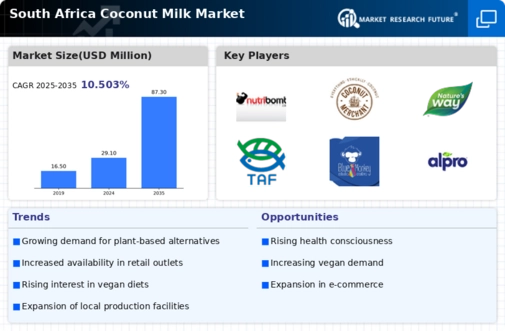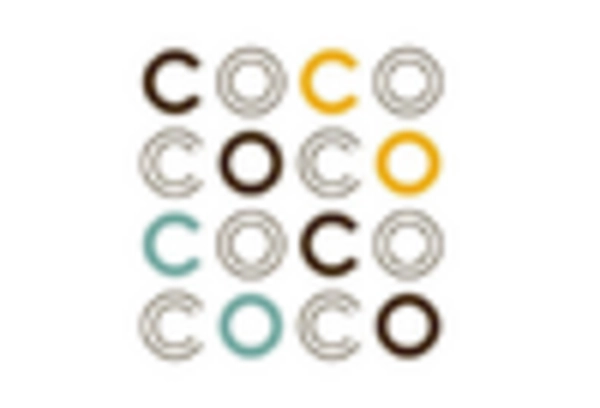Culinary Versatility and Innovation
The coconut milk market in South Africa is bolstered by the culinary versatility of coconut milk, which is increasingly recognized as a key ingredient in both traditional and modern recipes. Its ability to enhance flavors and provide a creamy texture makes it a popular choice among chefs and home cooks alike. The market is witnessing a rise in innovative product offerings, including flavored coconut milk and ready-to-use coconut milk-based sauces. This innovation caters to diverse consumer tastes and preferences, further driving market growth. Additionally, the incorporation of coconut milk into various cuisines, from Asian to Western, highlights its adaptability, suggesting that the coconut milk market will continue to thrive as culinary trends evolve.
Rising Demand for Dairy Alternatives
The coconut milk market in South Africa experiences a notable surge in demand for dairy alternatives, driven by a growing population of lactose-intolerant individuals and those adopting vegan lifestyles. As consumers increasingly seek plant-based options, the market for coconut milk is projected to expand significantly. Recent data indicates that the dairy alternatives segment is expected to grow at a CAGR of approximately 10% over the next five years. This shift towards non-dairy products is reshaping consumer preferences, leading to a broader acceptance of coconut milk as a versatile ingredient in various culinary applications. The coconut milk market is thus poised to benefit from this trend, as more consumers incorporate coconut milk into their diets, whether in beverages, cooking, or baking.
Increased Awareness of Health Benefits
The coconut milk market in South Africa is significantly influenced by the increasing awareness of the health benefits associated with coconut milk consumption. Rich in medium-chain triglycerides (MCTs), coconut milk is perceived as a healthier alternative to traditional dairy products. Health-conscious consumers are drawn to its potential benefits, including improved digestion and weight management. Recent surveys indicate that approximately 60% of consumers are actively seeking products that promote health and wellness, which positions coconut milk favorably within the market. As more individuals prioritize their health, the demand for coconut milk is likely to rise, further solidifying its place in the South African food and beverage landscape.
Sustainability and Ethical Sourcing Trends
The coconut milk market in South Africa is positively impacted by the rising consumer demand for sustainably sourced and ethically produced products. As environmental concerns gain traction, consumers are increasingly scrutinizing the sourcing practices of food products. The coconut milk market is responding by promoting transparency and sustainability in its supply chains. Brands that emphasize ethical sourcing and environmentally friendly practices are likely to resonate with the growing segment of eco-conscious consumers. Recent studies suggest that approximately 70% of South African consumers are willing to pay a premium for products that align with their values, indicating a potential for growth in the coconut milk market as sustainability becomes a key purchasing factor.
Growing Interest in Ethnic and Exotic Flavors
The coconut milk market in South Africa is experiencing growth due to the rising interest in ethnic and exotic flavors among consumers. As culinary exploration becomes more prevalent, coconut milk is increasingly utilized in various international dishes, particularly in Southeast Asian cuisine. This trend is reflected in the expanding range of coconut milk products available in local supermarkets, catering to adventurous palates. The market is likely to benefit from this growing curiosity, as consumers seek authentic flavors and experiences. Furthermore, the incorporation of coconut milk into fusion dishes may attract a broader audience, enhancing its appeal and driving sales in the coconut milk market.

















